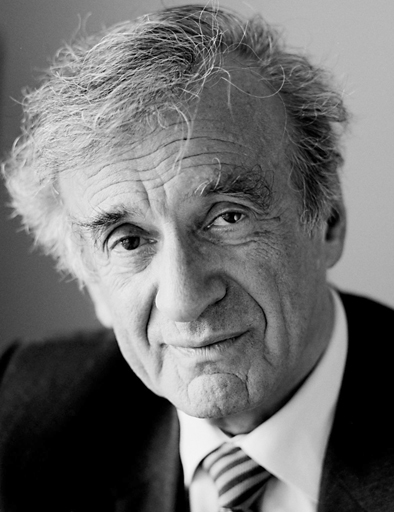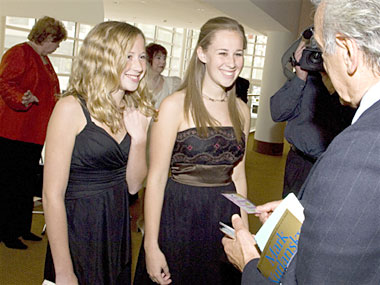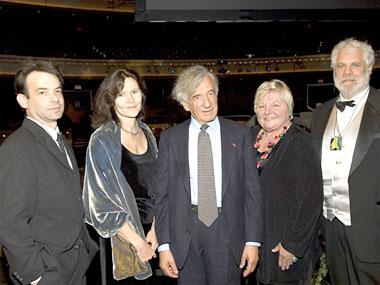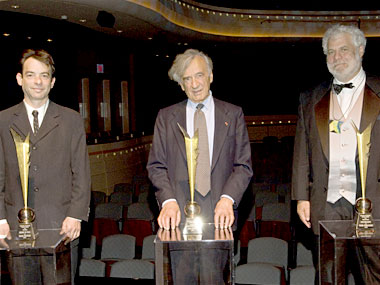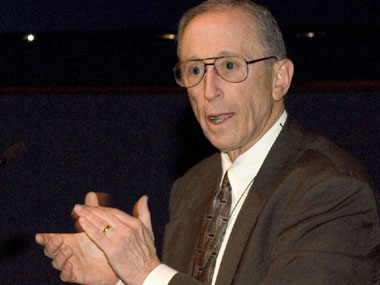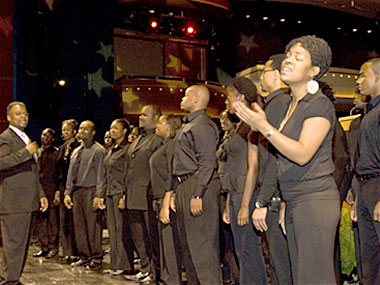Words of gratitude. First to our common Creator. This is what the Jewish tradition commands us to do. At special occasions, one is duty-bound to recite the following prayer: “Barukh shehekhyanu vekiymanu vehigianu lazman haze” – “Blessed be Thou for having sustained us until this day.”
Then — thank you, Chairman Aarvik, for the depth of your eloquence. And for the generosity of your gesture. Thank you for building bridges between people and generations. Thank you, above all, for helping humankind make peace its most urgent and noble aspiration.
I am moved, deeply moved by your words, Chairman Aarvik. And it is with a profound sense of humility that I accept the honor – the highest there is – that you have chosen to bestow upon me. I know your choice transcends my person.
Do I have the right to represent the multitudes who have perished? Do I have the right to accept this great honor on their behalf? I do not. No one may speak for the dead, no one may interpret their mutilated dreams and visions. And yet, I sense their presence. I always do – and at this moment more than ever. The presence of my parents, that of my little sister. The presence of my teachers, my friends, my companions…
This honor belongs to all the survivors and their children and, through us to the Jewish people with whose destiny I have always identified.
I remember: it happened yesterday, or eternities ago. A young Jewish boy discovered the Kingdom of Night. I remember his bewilderment, I remember his anguish. It all happened so fast. The ghetto. The deportation. The sealed cattle car. The fiery altar upon which the history of our people and the future of mankind were meant to be sacrificed.
I remember he asked his father: “Can this be true? This is the twentieth century, not the Middle Ages. Who would allow such crimes to be committed? How could the world remain silent?”
And now the boy is turning to me. “Tell me,” he asks, “what have you done with my future, what have you done with your life?” And I tell him that I have tried. That I have tried to keep memory alive, that I have tried to fight those who would forget. Because if we forget, we are guilty, we are accomplices.
And then I explain to him how naïve we were, that the world did know and remained silent. And that is why I swore never to be silent whenever wherever human beings endure suffering and humiliation. We must take sides. Neutrality helps the oppressor, never the victim. Silence encourages the tormentor, never the tormented. Sometimes we must interfere. When human lives are endangered, when human dignity is in jeopardy, national borders and sensitivities become irrelevant. Wherever men and women are persecuted because of their race, religion, or political views, that place must – at that moment – become the center of the universe.
Of course, since I am a Jew profoundly rooted in my people’s memory and tradition, my first response is to Jewish fears, Jewish needs, Jewish crises. For I belong to a traumatized generation, one that experienced the abandonment and solitude of our people. It would be unnatural for me not to make Jewish priorities my own: Israel, Soviet Jewry, Jews in Arab land… But others are important to me. Apartheid is, in my view, as abhorrent as anti-Semitism. To me, Andrei Sakharov’s isolation is as much a disgrace as Joseph Begun’s imprisonment and Ida Nudel’s exile. As is the denial of solidarity and its leader Lech Walesa’s right to dissent. And Nelson Mandela’s interminable imprisonment.
There is so much injustice and suffering crying out for our attention: victims of hunger, of racism and political persecution – in Chile, for instance, or in Ethiopia – writers and poets, prisoners in so many lands governed by the Left and by the Right.
Human rights are being violated on every continent. More people are oppressed than free. How can one not be sensitive to their plight? Human suffering anywhere concerns men and women everywhere. That applies also to Palestinians to whose plight I am sensitive but whose methods I deplore when they lead to violence. Violence is not the answer. Terrorism is the most dangerous of answers. They are frustrated, that is understandable, something must be done. The refugees and their misery. The children and their fear. The uprooted and their hopelessness. Something must be done about their situation. Both the Jewish people and the Palestinian people have lost too many sons and daughters and have shed too much blood. This must stop, and all attempts to stop it must be encouraged. Israel will cooperate, I am sure of that. I trust Israel for I have faith in the Jewish people. Let Israel be given a chance, let hatred and danger be removed from their horizons, and there will be peace in and around the Holy Land. Please understand my deep and total commitment to Israel: if you could remember what I remember, you would understand. Israel is the only nation in the world whose existence is threatened. Should Israel lose but one war, it would mean her end and ours as well. But I have faith. Faith in the God of Abraham, Isaac, and Jacob, and even in His creation. Without it no action would be possible. And action is the only remedy to indifference, the most insidious danger of all. Isn’t that the meaning of Alfred Nobel’s legacy? Wasn’t his fear of war a shield against war?
There is so much to be done, there is so much that can be done. One person – a Raoul Wallenberg, an Albert Schweitzer, Martin Luther King, Jr. – one person of integrity, can make a difference, a difference of life and death.
As long as one dissident is in prison, our freedom will not be true. As long as one child is hungry, our life will be filled with anguish and shame. What all these victims need above all is to know that they are not alone; that we are not forgetting them, that when their voices are stifled we shall lend them ours, that while their freedom depends on ours, the quality of our freedom depends on theirs.
This is what I say to the young Jewish boy wondering what I have done with his years. It is in his name that I speak to you and that I express to you my deepest gratitude as one who has emerged from the Kingdom of Night. We know that every moment is a moment of grace, every hour an offering; not to share them would mean to betray them.
Our lives no longer belong to us alone; they belong to all those who need us desperately.
Thank you, Chairman Aarvik. Thank you, members of the Nobel Committee. Thank you, people of Norway, for declaring on this singular occasion that our survival has meaning for mankind.
— Elie Wiesel
Nobel Prize Acceptance Speech,
Delivered in Oslo on December 10, 1986



